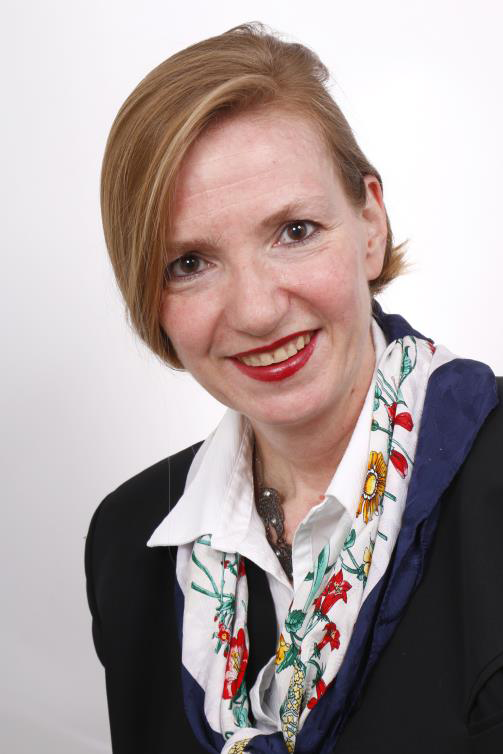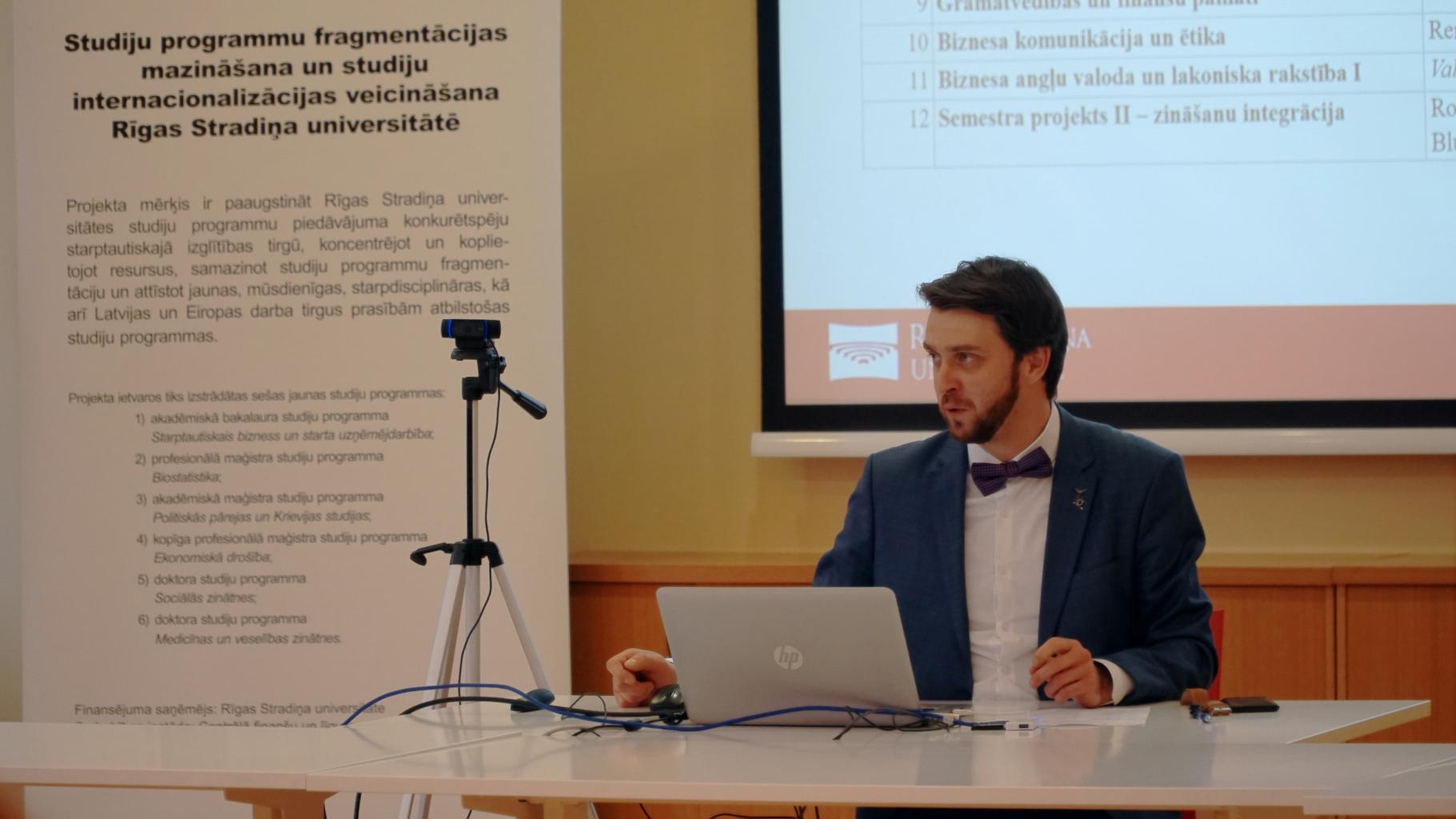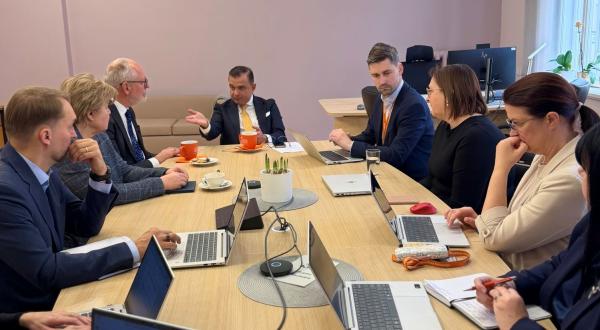RSU Develops International Business Studies Programme
The main advantage of the new International Business and Start-up Entrepreneurship (Starptautiskais bizness un jaunuzņēmējdarbība) study programme at Rīga Stradiņš University (RSU) is its international environment created by the selection of guest lecturers as well as by the studies themselves, which will be conducted not only at RSU, but in other European countries as well.
Christiane Trüe (pictured), a professor at Bremen University of Applied Sciences, is one of the programme’s guest lecturers. During her visit the professor will teach EU structure and legislation as well as hold discussions on the most important issues facing the EU including economic transformation, the development of a digital business environment, Brexit, transatlantic relations and the impact of climate change.

The new study programme will be taught in English and RSU invites both international and Latvian students to enrol in the programme that is scheduled to start in the autumn of 2020.
Brussels Week
The study programme is based around co-operation and the week of studies in Brussels, or Brussels Week, is a good example of its international environment, which involves joint studies between students from RSU and the Bremen University of Applied Sciences. The lectures will be conducted by the Head of the study programme at RSU, Romāns Putāns, and Professor Trüe who will teach EU structure and legislation. The professor believes that it is not only important to learn how the EU functions, but also to know what the current issues facing the EU are like Brexit, or climate change.
 Putāns (pictured) explains that in addition to learning about the EU Brussels Week will provide RSU students with unique opportunities for international communication, co-operation and new experiences as the group from Bremen includes students from India, China, Russia, Canada, USA, Pakistan, Cameroon and other countries. Putāns emphasises that the course will provide the opportunity to build contacts and learn about start-up entrepreneurship not only in Europe, but on other continents as well, and might also lead to joint business projects. Brussels Week will be a week of intensive learning – the schedule includes a wide range of seminars as well as meetings with students from different EU countries, members of the European Council, the European Parliament and Commission. There will also be meetings with a business incubator in Brussels and visits to other institutions and bodies, and, of course, meetings with EU authorities, experts and representatives from the business environment.
Putāns (pictured) explains that in addition to learning about the EU Brussels Week will provide RSU students with unique opportunities for international communication, co-operation and new experiences as the group from Bremen includes students from India, China, Russia, Canada, USA, Pakistan, Cameroon and other countries. Putāns emphasises that the course will provide the opportunity to build contacts and learn about start-up entrepreneurship not only in Europe, but on other continents as well, and might also lead to joint business projects. Brussels Week will be a week of intensive learning – the schedule includes a wide range of seminars as well as meetings with students from different EU countries, members of the European Council, the European Parliament and Commission. There will also be meetings with a business incubator in Brussels and visits to other institutions and bodies, and, of course, meetings with EU authorities, experts and representatives from the business environment.
Co-operation as a pre-requisite to development
Professor Trüe believes that the co-operation between countries, universities, other institutions, as well as between students is an important driving force of EU development. The professor emphasises that even Germany is not a large country on a global scale, and that progressive change is only possible through co-operation. Co-operation between European universities is a good opportunity to bring students and interests together, because students are the decision-makers of the future and they require international experience.
Putāns mentions the Erasmus programme as the good example of successful international student co-operation as it provides thousands of university students worldwide with an opportunity to co-operate, learn and implement joint projects.
Support for start-ups in Germany
Since one of the objectives of the new study programme is to promote the development of new, innovation-oriented companies, we asked Professor Trüe about what support start-ups receive in Germany. The professor is direct: support in the German business environment comes down to individuals and experienced businessmen’s will to support newcomers. There are businesses that look beyond the boundaries of their businesses and provide support, however like in many other countries, large businesses in Germany that are successful and occupy stable positions in the market are not always willing to support and promote potential competitors. Rather they attempt to attract young talent to their business as soon as they see potential in a newcomer’s personality or ideas.
The overall development of start-ups in Germany is subject to regional politics. In Berlin, for instance, start-up development is actively supported and plays an important role in the city’s development strategy. In Bremen, which according to Professor Trüe is not one of Germany’s wealthiest regions, support for start-ups mainly comes from opportunities offered by EU structural funds, meanwhile the municipality itself invests in co-funding. Bremen would most probably like to invest more in the development of business ideas, but the amount of regionally accessible funding and co-funding opportunities sometimes limit the projects and ideas. Crowdfunding, which enables any citizen to invest a certain sum of money in a business activity that they favour hoping for future profit, is a common way of supporting start-ups and business ideas in Germany. Crowdfunding usually takes place via the internet and gathering multiple moderate sums from individual investors together can result in a considerable amount. In 2015 crowdfunding attracted 30bn euros to different projects worldwide.
Impressions of RSU
When answering the question about what her impressions of RSU are the professor characterises the university as open and inviting and its students as inquisitive and active. Both Professor Trüe and Putāns are convinced this program will provide students with the opportunity to establish and develop co-operation with students in other countries, which will most probably lead to innovative new business on a European or even global level. Perhaps the next Bill Gates or Steve Jobs will start studying International Business and Start-up Entrepreneurship at RSU!

Related news
 Discussions underway on developing Latvia’s first bachelor-level paramedic programme at RSUDevelopment, For High School Students
Discussions underway on developing Latvia’s first bachelor-level paramedic programme at RSUDevelopment, For High School Students


